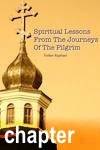 A pilgrim need not be in the desert, but deep in the world, leading a seeking, prayerful, and humble life.
A pilgrim need not be in the desert, but deep in the world, leading a seeking, prayerful, and humble life.
Dear beloved,
Let me tell you a story of Abba Achilles, a Desert Father.
Three old men came to Abba Achilles and asked a favor from the holy father.
The first old man asked, “Father, please make a fishing net for me.” Abba Achilles replied, “No, I will not make you one.”
The second old man asked, “Father, please make a fishing net for me out of charity, so that we may have a souvenir of you of the monastery.” Abba Achilles replied, “No, I do not have time.”
The third old man, with a bad reputation, asked, “Father, please make me a fishing net so that I have something from your hands.” Abba Achilles replied, “For you, I will make one.”
The other two old men were perturbed and asked privately, why the Abba would make a fishing net for the old man with the bad reputation, but not the two of them.
Abba Achilles replied, “I did not make a fishing net for each of you, because you would believe I have no time. But if I did not make a fishing net for him, he would have thought that I am aware of his sins and thus denied him the request. That would have broken down our relationship. Now, I have cheered his soul and he would not be filled with grief.”
Therefore, we in the pastoral labors have to understand that as spiritual elders, much as Abba Achilles and Saint Seraphim of Sarov demonstrated, that love much always go before our steps, and that we must keep vigil of our actions so that those who seek our counsel, can be filled with joy for the Lord, and not feel rejected. We were called as humble servants of the Lord, not masters.
9. Movements of the heart – Saint Seraphim taught us, that the differentiator between the signs of God, and the signs of the evil one, is what we experience from the signs. When we accept anything from God, we can only experience joy in our hearts. But when we accept things from the devil, no matter how sugarcoated it was presented to us, the fruits are always bitter, and will torment us. The spiritual fruits of a heart truly resting in the Lord feels love, joy, peace, long suffering, gentleness, goodness, faith, meekness, and temperance (Galatians 5:22-23).
Be not deceived by the signs and fruits of the evil one, for he stalks us, assaults us relentlessly especially if we are seeking God (Psalm 9:29). He would even present himself as an angel of light. That is why, we are told be keep vigil, and discern all thoughts and feelings within us, release our burdens unto God, and pray with a penitent and humble heart.
Saint Seraphim described the difference between a pure heart, and an impure heart. The pure heart has transfigured the passions so that the evil one can only touch indirectly or externally. However, the impure heart is filled with unclean passions, and the evil one can twist and distort the impure heart internally and strip the person of any attempt of reaching God. This is why the discernment and transfiguration of passions is so important, and that only with repentant and humble heart of tears can we ask God to take away our passions and fill us with a joyful resting in Him.
10. An active contemplative – Saint Seraphim taught that since a person has two parts, a soul, and a body, so the spiritual pilgrimage must be a synergy of two things – physical activities (active), and spiritual activities (contemplative).
An active life that draws us closer to God refer to fasting, abstinence, prayer, attending the Divine Liturgy, good deeds, etc, which are meant as a spiritual discipline that would lead us to Him (St Matthew 7:14).
A contemplative life that draws us closer to God are the inner life, the prayerful life “in the closet”, that requires us to discern, examine, reflect, and pray unceasingly.
Saint Seraphim taught that the active life must precede the contemplative life. We must not short-circuit our spiritual path or progression by jumping into the contemplative life without first walking diligently and humbly, the active life. This is because the active life helps us to transfigure our passions, and slowly and steadily lead us to a cleaner contemplative path (St Matthew 5:8).
“Only those who are perfect by their experience can without danger proceed to contemplation” – Saint Gregory of Nazianzus, father among the saints.
We are advised by the Holy Fathers to seek out a good spiritual director who will guide us along both the active and contemplative lives. If we cannot find one, do not despair, but pray with tears to God to guide us through the Holy Scriptures (St John 5:39).
Let us pray, beloved, for the strength and mercy of God, when we struggle to transfigure our passions towards Him,
“Lord Jesus Christ, Son of God, have mercy on us, sinners”.
Book Index | Prev: Penitent & humble | Next: St Seraphim’s Rule
